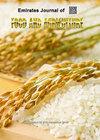最大限度地利用椰枣渣生产环保燃料型煤
IF 0.7
4区 农林科学
Q3 AGRONOMY
引用次数: 0
摘要
本研究旨在最大限度地利用椰枣渣,并将其转化为一种环保形式的燃料。使用椰枣品种Khalas(叶片和全叶)的残留物在三种含水量(8、10和12%)和四种储存时间(0、15、30和45天)下生产燃料型煤。研究了这些型煤的机械性能、燃料性能和质量性能。结果表明,叶片在成型燃料的力学性能和燃料质量性能方面效果最好。当含水量为10%时,叶片的最佳压应力为24.98 MPa;当含水量为12%时,整个叶片的最佳压应力为4.27 MPa。在不同含水率下,第二贮藏期的效果最好。结果表明,含水率和储存期对其力学性能有显著影响。随着含水率的增加,成型煤的水解时间和耐久度增加。叶片型煤和全叶型煤的热值分别为17.78 ~ 18.12 MJ/kg和16.54 ~ 17.78 MJ/kg。这些优质的蜂窝煤可以处理和使用,特别是在没有其他能源的农村地区。关键词:热值;椰枣渣;耐用性;燃料价值指数;弹性模量本文章由计算机程序翻译,如有差异,请以英文原文为准。
Maximize utilization of date palm residues to produce environmentally friendly fuel briquettes
This study aimed to maximize the utilization of date palm residues and convert them into an environmentally friendly form of fuel. The residues of the date palm variety Khalas (leaf fronds and whole fronds) were used to produce fuel briquettes at three moisture contents (8, 10, and 12%) and four storage times (0, 15, 30, and 45 days). The mechanical, fuel, and quality properties of these briquettes were investigated. The results showed that the leaf fronds had the best results in terms of mechanical properties and fuel quality properties of the briquettes. The best results for compressive stresses for the leaf fronds were 24.98 MPa at 10% moisture content and for the whole fronds were 4.27 MPa at 12%. The second storage period gave the best results for all briquettes at the different moisture contents. The results showed significant effects of moisture content and storage period on mechanical properties. The hydrolysis time and durability of the briquettes increased with increasing moisture content. The calorific value of leaf fronds and whole fronds briquettes ranged between (17.78 and 18.12 MJ/kg) and (16.54 and 17.78 MJ/kg), respectively. These good quality briquettes can be handled and used, especially in rural areas where other energy sources are not available.
Keywords: Calorific value; Date palm residues; Durability; Fuel value index; Modulus of elasticity
求助全文
通过发布文献求助,成功后即可免费获取论文全文。
去求助
来源期刊

Emirates Journal of Food and Agriculture
AGRONOMYFOOD SCIENCE & TECHNOLOGY&nb-FOOD SCIENCE & TECHNOLOGY
CiteScore
1.80
自引率
0.00%
发文量
18
期刊介绍:
The "Emirates Journal of Food and Agriculture [EJFA]" is a unique, peer-reviewed Journal of Food and Agriculture publishing basic and applied research articles in the field of agricultural and food sciences by the College of Food and Agriculture, United Arab Emirates University, United Arab Emirates.
 求助内容:
求助内容: 应助结果提醒方式:
应助结果提醒方式:


